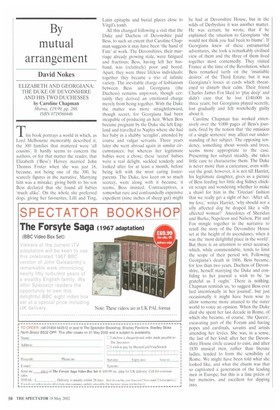By mutual arrangement
David !slakes
ELIZABETH AND GEORGIANA: THE DUKE OF DEVONSHIRE AND HIS TWO DUCHESSES by Caroline Chapman Murray, £19.99, pp. 288, ISBN 0719560446 This book portrays a world in which, as Lord Melbourne memorably described it, the 300 families that mattered were all cousins'. It hardly seems to concern the authors, or for that matter the reader. that Elizabeth (`Bess') Hervey married John Thomas Foster when she was just 18, because, not being one of the 300, he scarcely figures in the narrative. Marrying him was a mistake; giving birth to his son Bess declared that she found all babies 'much alike'. On the whole she preferred dogs, giving her favourites, LiIli and Ting,
Latin epitaphs and burial places close to Virgil's tomb.
All this changed following a visit that the Duke and Duchess of Devonshire paid Bess, to such an extent that Caroline Chapman suggests it may have been the hand of Fate' at work. The Devonshires, their marriage already growing stale, were fatigued and fractious; Bess, having left her husband, was (relatively) poor and bored. Apart, they were three lifeless individuals; together they became a trio of infinite variety. The inevitable charge of lesbianism between Bess and Georgiana (the Duchess) remains unproven, though certainly they derived an emotional charge merely from being together. With the Duke the matter was more straightforward, though secret, for Georgiana had been incapable of producing an heir. When Bess became pregnant by the Duke she left England and travelled to Naples where she had her baby in a shabby 'seraglio', attended by coarse and vulgar servants. Three years later she went abroad again in similar circumstances; but whereas her legitimate babies were a chore, these 'secret' babies were a real delight, suckled tenderly and looked after for at least a month, before being left with the most caring fosterparents. The Duke, less keen on so much secrecy, went along with it because, it seems, Bess insisted. Contraceptives, a somewhat rare and confoundedly expensive expedient (nine inches of sheep gut) might be had at Devonshire House, but in the wilds of Derbyshire it was another matter. He was certain, he wrote, that if he explained the situation to Georgiana 'she would not think you had been to blame'. If Georgiana knew of these extramarital adventures, she took a remarkably civilised view of them and the three of them lived together most contentedly. They visited France at the time of the Revolution, when Bess remarked tartly on the 'insatiable desires' of the Third Estate: but it was Georgiana's losses at cards which threatened to disturb their calm. Their friend Charles James Fox liked to 'play deep' and didn't care that he lost £140,000 in three years; but Georgiana played secretly, lost gradually and felt wretchedly guilty about it.
Caroline Chapman has worked extensively over the 9,000 pages of Bess's journals, fired by the notion that 'the omission of a single sentence' may affect our understanding of her subject. The opposing tendency, something about woods and trees, seems more appropriate to the case. Presenting her subject steadily, she takes little care to characterise them. The Duke is never more than a caricature, even without the gout; however, it is not till Harriet, his legitimate daughter, gives us a picture of Bess feeding her little dog Sidney chicken scraps and wondering whether to make a shawl for him in the 'Grecian' fashion that we really get a sight of her. 'After all, my love.' writes Harriet, 'why should not a silly affected dog be draped like a silly affected woman?' Anecdotes of Sheridan and Burke, Napoleon and Nelson, Pitt and Fox mingle together in the narrative to retell the story of the Devonshire House set at the height of its ascendancy, when it was the 'most delightful place in the world'. But there is an attention to strict accuracy which, while commendable, tends to limit the scope of their period wit. Following Georgiana's death in 1806, Bess became, for less than two years, Duchess of Devonshire, herself marrying the Duke and confiding to her journal a wish to be 'as grateful as 1 ought.' •There is nothing, Chapman reminds us, 'to suggest Bess ever lied intentionally in her journal', but just occasionally it might have been wise to allow someone more attuned to the outer world to voice an opinion. When the Duke died she spent her last decade in Rome, of which she became, of course, 'the Queen', excavating part of the Forum and having popes and cardinals, savants and artists attending her levees. She was, in a sense, the last of her kind; after her the Devonshire House circle ceased to exist, and after 1830 musical men, rather than literate ladies, tended to form the sensibility of Rome. We might have been told what she looked like, and what the charm was that so captivated a generation of the leading men in Europe; but this is a fine precis of her memoirs, and excellent for dipping into.














































































 Previous page
Previous page